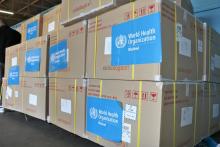Malawi receives 1.4 million doses of Oral Cholera Vaccines to avert the spread of Cholera outbreak among vulnerable populations.
13 April 2023
Lilongwe- Malawi has received 1.4 million doses of Oral Cholera Vaccines (OCV) from the International Coordinating Group (ICG) with support from GAVI as the country faces risk of continuous spread of cholera. This is following the impact of Tropical Cyclone Freddy that hit 15 districts of Southern Malawi in early March that will further undermine several social determinants for good health. Nearly 2 million people have been affected, with over 600 thousand people internally displaced. With water and sanitation facilities damaged, residents in the affected areas are vulnerable to disease outbreaks, especially waterborne diseases such as cholera.
“The effects of Cyclone Freddy both on health and water and sanitation systems could potentially threaten the progress made in controlling the cholera outbreak in Malawi with a continuous downward trend observed over the recent weeks, says Dr Neema Rusibamayila Kimambo, WHO Representative for Malawi. “As WHO in collaboration with UNICEF and other partners, we are supporting the Ministry of Health to safeguard the gains we have acquired in responding to the current cholera outbreak with OCV as an important intervention.”
The World Health Organization (WHO) in collaboration with other partners supported the Ministry of Health to respond to the immediate health needs of communities affected by the cyclone. The organization has supported the country in acquiring OCV as one of the approaches to strengthen cholera outbreak preparedness and response. WHO has initiated arrangements to secure 1.4 million doses of oral cholera vaccines from the Global emergency stockpile following the request from the Ministry of Health.
“The Ministry is working diligently with WHO and other partners to minimize the suffering of people affected by the cyclone and to restore health system in disaster struck areas. The OCV that Malawi has received is a critical additional tool that will reinforce cholera control strategies in vulnerable communities,” said the Minister of Health Honourable Khumbize Kandondo Chiponda MP.
Malawi is experiencing the worst cholera outbreak in the country’s history. The outbreak started in March 2022 has a record of 57 656 cases and 1 736 deaths as of 13 April 2023.
As part of response scale-up, WHO and other partners supported the Ministry of Health’s Cholera response efforts by deploying surge staff, providing essential Cholera supplies, and revamping Cholera treatment facilities. These measures enhanced the quality of Cholera case management and outbreaks, thus reducing mortality.
WHO recommends the use of OCV as an additional measure to limit the spread of cholera during outbreaks and to contribute to cholera control in humanitarian crises with a high risk of cholera. Following the vaccine vaccine’s arrival, the country is expected to conduct a vaccination campaign in the coming weeks. The vaccines will be deployed to vulnerable populations: in cholera hotspots, in communities where water and sanitation facilities are damaged, and in areas with a high number of internally displaced persons. The planned campaign will target individuals aged one year and above living in cholera hotspots.
“Cholera is preventable; therefore, WHO is ensuring communities at risk are protected from this disease. OCV is one of the interventions to curb cholera transmission. The campaign will be a bridge for launching resilient and long-term water, sanitation and hygiene interventions,” says Dr Kimambo.
Cholera is an acute diarrheal infection caused by eating or drinking food or water contaminated with the bacterium Vibrio cholerae. It is a serious disease that can cause severe acute watery diarrhoea with severe dehydration. Cholera affects both children and adults and can kill within hours if untreated. Recommended cholera disease prevention and control measures include providing safe drinking water and proper sanitation to at-risk populations and timely and appropriate healthcare for those with clinical disease.
Envisioning a world where cholera is not a public health threat, the Global Taskforce on Cholera Control (GTFCC) launched the Global roadmap for reducing cholera deaths by 90% by 2030. The WHO Office for African Region adopted the roadmap for the region. Through the implementation of the roadmap, cholera endemic countries will be supported to contain outbreaks through early detection and quick response, implementing a targeted, comprehensive prevention strategy using vaccines in cholera hotspots, and strengthening the overall multisectoral coordination through partnerships and mobilizing resources to implement National cholera control plans.
WHO appreciates the Ministry of Health leadership and the partnership with UNICEF and Gavi and the International Coordinating Group (ICG) on Cholera vaccine provision.
Communications Officer
WHO Malawi
email: mukhunav [at] who.int (mukhunav[at]who[dot]int)
Tel: +265 999 375 094



